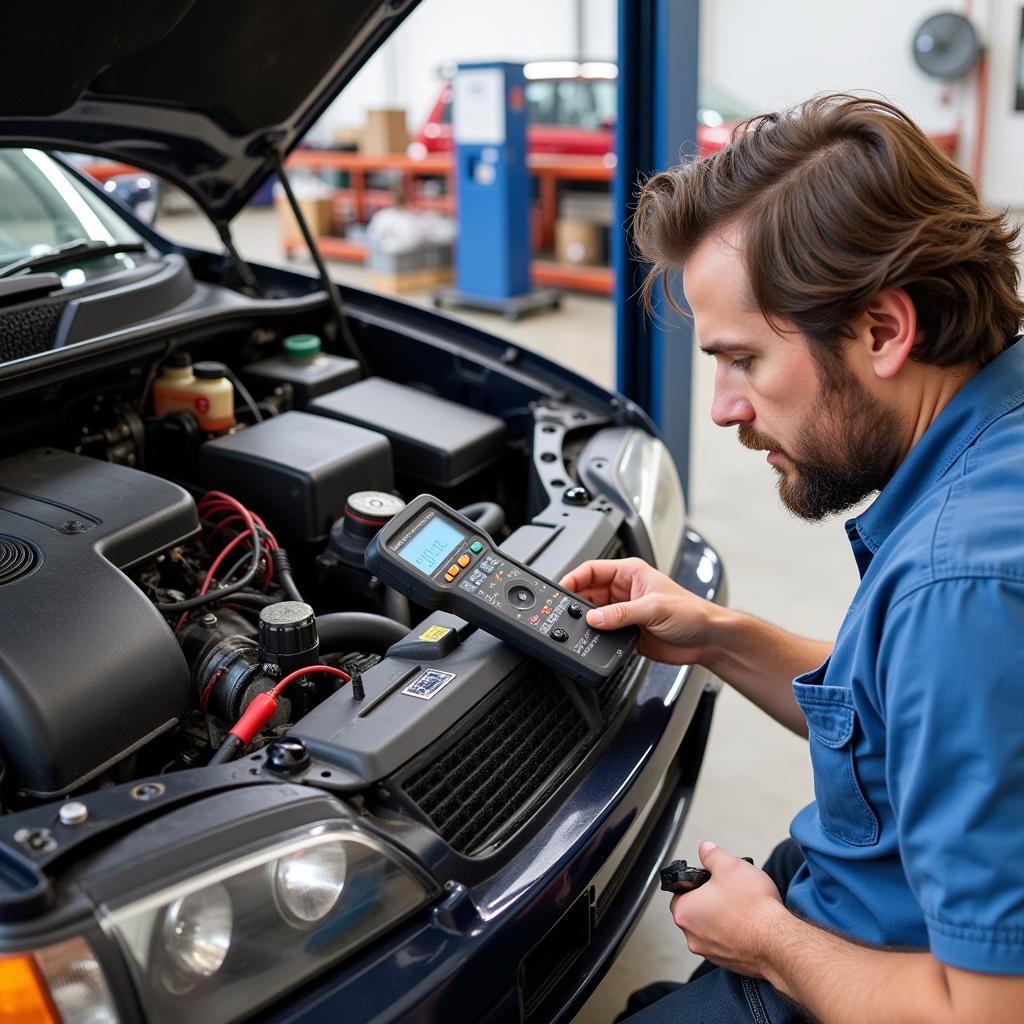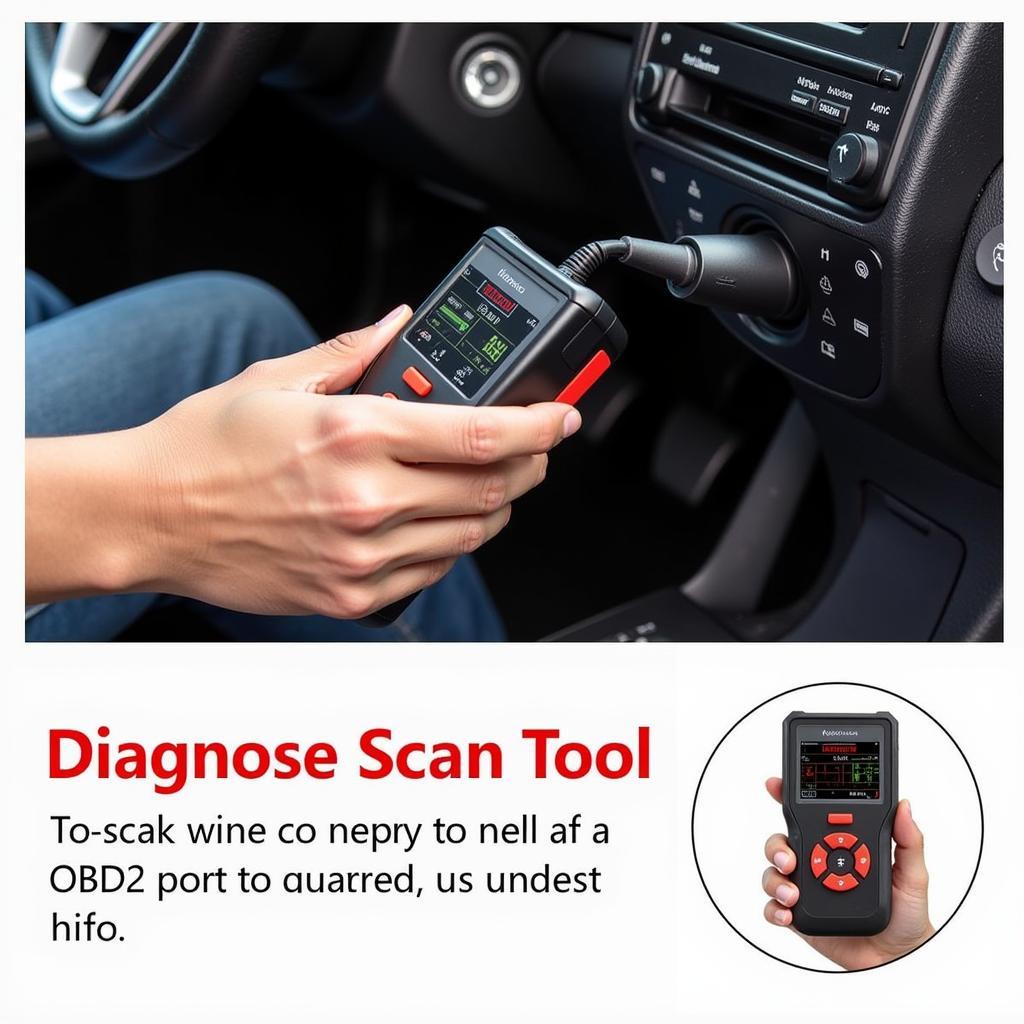Finding the right Scan Tool For Older Cars can feel like navigating a minefield. With so many options available, it’s tough to know which one will actually work with your classic ride. This guide will help you understand the intricacies of choosing a scan tool that will effectively diagnose and troubleshoot issues in your older vehicle.
Choosing the right scan tool can be a significant investment, so making an informed decision is crucial. If you’re working on older vehicles, finding a compatible and effective scan tool can be particularly challenging. This isn’t just for professional mechanics; owning a best car scan tool can empower any car enthusiast to take control of their vehicle’s maintenance.
Understanding OBD Standards and Your Older Car
Before diving into the specifics of scan tools, let’s discuss OBD (On-Board Diagnostics) standards. OBD-II, the current standard, became mandatory in 1996 for all cars sold in the United States. Vehicles manufactured before this date often use OBD-I, which has different connectors and communication protocols. This is where the challenge lies in finding a compatible scan tool. OBD-I systems varied significantly between manufacturers, making it crucial to choose a tool that specifically supports your car’s make and model.
What if My Car is Pre-OBD?
Cars manufactured before the introduction of OBD systems still have diagnostic capabilities, but they typically require specialized equipment. For example, some older vehicles use proprietary connectors and require manufacturer-specific scan tools. Others might rely on simpler methods like checking voltage signals or using analog gauges.
 Scan Tool for Pre-OBD Cars
Scan Tool for Pre-OBD Cars
Key Features to Look for in a Scan Tool for Older Cars
When searching for a scan tool for older cars, several key features should be on your checklist. Compatibility is paramount – ensure the tool supports the specific OBD-I protocol used by your vehicle. Consider the following factors:
- Vehicle Coverage: Does the tool support the make, model, and year of your car? Some scan tools specialize in certain manufacturers, while others offer broader coverage.
- OBD-I and OBD-II Support: If you work on a mix of older and newer cars, a scan tool that supports both OBD-I and OBD-II can be a valuable investment.
- Live Data Streaming: This feature allows you to monitor real-time sensor data, which can be invaluable for diagnosing issues that are intermittent or difficult to reproduce.
- Code Reading and Clearing: The ability to read and clear diagnostic trouble codes (DTCs) is essential for identifying the root cause of problems.
- Bi-Directional Controls: This feature, while not always necessary for older cars, can be helpful for testing components like actuators and solenoids.
- User-Friendliness: A scan tool with a clear and intuitive interface can save you time and frustration.
How Do I Determine My Car’s OBD Standard?
Checking your car’s owner’s manual is often the easiest way to identify its OBD standard. You can also look for the OBD connector under the dashboard, usually on the driver’s side. A powerful biometrics scanning tool could be useful for modern cars, but focusing on OBD-I compatibility is key for older models.
Choosing Between Professional and DIY Scan Tools
Scan tools cater to a wide range of users, from professional mechanics to DIY enthusiasts. Professional-grade tools offer advanced features and robust construction, but come at a higher price point. DIY scan tools, on the other hand, provide a more affordable option with essential diagnostic capabilities. Consider your budget, skill level, and frequency of use when making your decision. Do you need a centech obd2 scan tool cable or something more specialized?
“Choosing the right scan tool is like selecting the right tool for any job. You wouldn’t use a hammer to tighten a screw,” says John Davis, a veteran automotive technician with over 20 years of experience. “For older cars, having a scan tool that speaks their language is crucial.”
Can I Use a Generic OBD-II Scanner on My Older Car?
While some generic OBD-II scanners might work on certain older cars equipped with early OBD-II systems, they are unlikely to be compatible with true OBD-I vehicles. Using an incompatible scanner can lead to inaccurate readings or even damage the car’s computer system.
Troubleshooting Common Issues with Older Car Scan Tools
Even with the right scan tool, you might encounter some challenges when diagnosing older cars. Here are some common issues and troubleshooting tips:
- Communication Errors: Ensure the scan tool is properly connected to the vehicle’s diagnostic port. Check for loose connections or damaged cables.
- Inaccurate Readings: Verify that the scan tool is compatible with the specific OBD-I protocol of your car. Consider trying a different scan tool designed for older vehicles.
- Difficulty Locating the Diagnostic Port: Consult your car’s owner’s manual for the exact location of the diagnostic port.
“Remember, patience is key when working on older cars,” advises Maria Sanchez, an automotive electrical specialist. “These vehicles can have their quirks, and diagnostics often require a bit of detective work.”
A free port scan tool freeware might be useful for checking computer networks, but for in-depth car diagnostics, a dedicated scan tool is necessary. While some may consider car scanner pro windows phone, a dedicated standalone tool often offers more comprehensive features for older cars.
Conclusion
Finding the right scan tool for older cars requires careful consideration of compatibility, features, and your specific diagnostic needs. By understanding the nuances of OBD-I systems and focusing on the key features outlined in this guide, you can make an informed decision and effectively troubleshoot issues in your classic vehicle. If you need further assistance, feel free to reach out to us. Contact ScanToolUS at +1 (641) 206-8880 or visit our office at 1615 S Laramie Ave, Cicero, IL 60804, USA.


